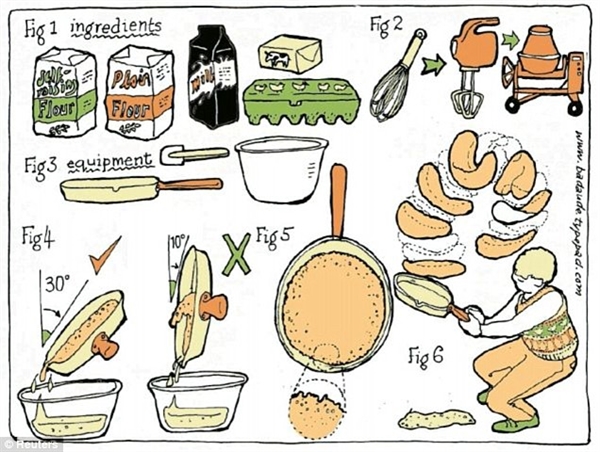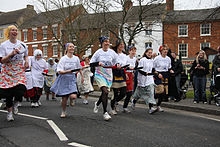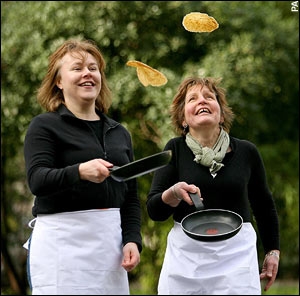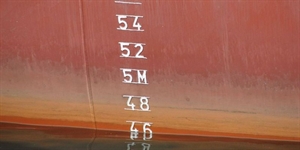Shrovetide Day 2025 is on Monday, February 10, 2025: what is pancake day all about?
Monday, February 10, 2025 is Shrovetide Day 2025. Happy Pancake Day! How to make a perfect pancake on Shrove Tuesday ... Shrove Tuesday used to be the
As an Amazon Associate I earn from qualifying purchases.

Shrove Tuesday is the term used in Ireland, the United Kingdom,[1] Australia,[2] Canada, and among US Episcopalians to refer to the day after Shrove Monday (or the more old fashioned Collop Monday) and before Ash Wednesday, when the Christian liturgical season of Lent begins.
In Ireland, the UK, and amongst Anglicans, Lutherans and possibly other Protestant denominations in Canada, including Newfoundland, Nova Scotia, Prince Edward Island and New Brunswick, this day is also known as Pancake Day, because it has been customary to eat pancakes on this day.[3][4][5]
In other parts of the Christian world — for example, in France and historically French-speaking Catholic parts of the United States and elsewhere — this day is called Mardi Gras or Fat Tuesday, again, in reference to eating special foods before the fasting season of Lent. In areas with large Polish-immigrant Christian populations, for example, Chicago, it is known as Tłusty Czwartek (literally: Fat Thursday) and celebrated on the Thursday before Lent. And in areas with German Christian traditions populations, such as Pennsylvania Dutch Country, it is known as Fasnacht Day (also spelled Fausnacht Day, Fauschnaut Day, and Fosnacht Day).
The French also have a festival associated with pancakes (crêpes), which is held on February 2 each year. This festival is called Chandeleur and is a celebration of light (the name is derived from the word "chandelle"). The festival is celebrated as Candlemas in the Anglican Church.). It is thought that pancakes are associated with this celebration because of the solar symbolism of their shape and color.
A traditional food for Mardi Gras are sweet fried dumplings, cenci, usually served in the shape of a loose knot (a 5cm wide, 20cm long strip of dough one extremity of which is passed through a slit in its middle). In New Orleans and French-speaking communities, another traditional food is king cake. Traditionally a community king for Mardi Gras was found by the man who ate a bean baked in the cake.
Pancakes are associated with the day preceding Lent because they were a way to use up rich foodstuffs such as eggs, milk, and sugar, before the fasting season of the 40 days of Lent. The liturgical fasting emphasized eating plainer food: in many cultures this meant no meat, and in some, no food prepared with dairy or eggs. Therefore, rich ingredients were cooked to use them immediately prior to the commencement of the fast. Pancakes and doughnuts also provided a minor celebratory feast prior to the fast itself [2].
The word shrove is a past tense of the English verb "shrive," which means to obtain absolution for one's sins by confessing and doing penance.[6] Shrove Tuesday gets its name from the shriving (confessing) that English Christians were expected to do prior to receiving absolution immediately before Lent began.[7] Shrove Tuesday is the last day of "shrovetide", the English equivalent to the Carnival tradition that developed separately in countries of Latin Europe.
In countries of the Carnival tradition, the day before Ash Wednesday is known either as the "Tuesday of Carnival" (in Spanish-speaking countries, Martes de Carnaval, in Portuguese-speaking countries, Terça-feira de Carnaval, in German Faschingsdienstag) or Fat Tuesday (in Portuguese-speaking countries Terça-feira Gorda, in French-speaking countries, Mardi Gras, in Italian-speaking countries, Martedì Grasso, in Sweden, Fettisdagen). In Estonian, Vastlapäev.
The term "Shrove Tuesday" is no longer widely known in the United States outside of the Episcopal Church Tradition [8][9] because of the increase in many immigrant populations and traditions since the 19th century. Mardi Gras was always the tradition among French Catholics.

is there such thing as holiday as pancake day?
Shrove Tuesday
Shrove Tuesday is the term used in the United Kingdom,[1] Ireland,[2] and Australia[3] to refer to the day after Shrove Monday (or the more old fashioned Collop Monday) and before Ash Wednesday (the liturgical season of Lent begins on Ash Wednesday). In these countries, particularly Ireland, and amongst Anglicans, Lutherans and possibly other protestant denominations in Canada, this day is also known as Pancake Day or Pancake Tuesday, because it is customary to eat pancakes on this day.[4][5][6]
In other parts of the world—for example, in historically Catholic and French-speaking parts of the United States and elsewhere—this day is called Mardi Gras.
The French also have a festival associated with pancakes (crêpes) which is held on February 2 each year. This festival is called Chandeleur and is a celebration of light (the name is derived from the word "chandelle" which also gave the English word "candle". The festival is known as Candlemas in English). It is thought that pancakes are associated to this celebration because of the solar symbolic of their shape and color.
The reason that pancakes are associated with the day preceding Lent is that the 40 days of Lent form a period of liturgical fasting, during which only the plainest foodstuffs may be eaten. Therefore, rich ingredients such as eggs, milk, and sugar are disposed of immediately prior to the commencement of the fast. Pancakes and doughnuts were therefore an efficient way of using up these perishable goods, besides providing a minor celebratory feast prior to the fast itself [2].
The word shrove is a past tense of the English verb "shrive," which means to obtain absolution for one's sins by confessing and doing penance.[7] Shrove Tuesday gets its name from the shriving (confession) that Anglo-Saxon Christians were expected to receive immediately before Lent.[8]
Shrove Tuesday is the last day of "shrovetide," which is the English equivalent to the Carnival tradition that developed separately out of the countries of Latin Europe. In countries of the Carnival tradition, the day before Ash Wednesday is known either as the "Tuesday of Carnival" (in Spanish-speaking countries, "Martes de Carnaval," in Portuguese-speaking countries, "Terça-feira de Carnaval", in German "Faschingsdienstag") or "Fat Tuesday" (in Portuguese-speaking countries "Terça-feira Gorda", in French-speaking countries, "Mardi Gras," in Italian-speaking countries, "Martedì Grasso"). In Estonian, Mardipäev.
The term "Shrove Tuesday" is not widely known in the United States,[9][10] especially in those regions that celebrate Mardi Gras on the day before Ash Wednesday.

Describe Shrove Tuesday (pancake day)?
Shrove Tuesday is the term used in the United Kingdom,[1] Ireland,[2] and Australia[3] to refer to the day after Shrove Monday (or the more old fashioned Collop Monday) and before Ash Wednesday (the liturgical season of Lent begins on Ash Wednesday). In these countries, particularly Ireland, and amongst Anglicans, Lutherans and possibly other protestant denominations in Canada, this day is also known as Pancake Day or Pancake Tuesday, because it is customary to eat pancakes on this day.[4][5][6] In other parts of the world—for example, in historically Catholic and French-speaking parts of the United States and elsewhere—this day is called Mardi Gras. In areas with large Polish-immigrant populations (for example, Chicago and Detroit) it is known as Paczki Day. And in areas with large German-immigrant populations (for example, Pennsylvania Dutch Country) it is known as Fasnacht Day (also spelled Fausnacht Day and Fauschnaut Day).
The French also have a festival associated with pancakes (crêpes) which is held on February 2 each year. This festival is called Chandeleur and is a celebration of light (the name is derived from the word "chandelle" which also gave the English word "candle". The festival is known as Candlemas in English). It is thought that pancakes are associated to this celebration because of the solar symbolic of their shape and color. A traditional food for Mardi Gras are sweet fried dumplings, cenci, usually served in the shape of a loose knot (a 5cm wide, 20cm long strip of dough one extremity of which is passed through a slit in its middle.) In New Orleans the traditional food is king cake.
The reason that pancakes are associated with the day preceding Lent is that the 40 days of Lent form a period of liturgical fasting, during which only the plainest foodstuffs may be eaten. Therefore, rich ingredients such as eggs, milk, and sugar are disposed of immediately prior to the commencement of the fast. Pancakes and doughnuts were therefore an efficient way of using up these perishable goods, besides providing a minor celebratory feast prior to the fast itself [2].
The word shrove is a past tense of the English verb "shrive," which means to obtain absolution for one's sins by confessing and doing penance.[7] Shrove Tuesday gets its name from the shriving (confession) that Anglo-Saxon Christians were expected to receive immediately before Lent.[8]
Shrove Tuesday is the last day of "shrovetide," which is the English equivalent to the Carnival tradition that developed separately out of the countries of Latin Europe. In countries of the Carnival tradition, the day before Ash Wednesday is known either as the "Tuesday of Carnival" (in Spanish-speaking countries, "Martes de Carnaval," in Portuguese-speaking countries, "Terça-feira de Carnaval", in German "Faschingsdienstag") or "Fat Tuesday" (in Portuguese-speaking countries "Terça-feira Gorda", in French-speaking countries, "Mardi Gras," in Italian-speaking countries, "Martedì Grasso"). In Estonian, Mardipäev.
The term "Shrove Tuesday" is not widely known in the United States,[9][10] especially in those regions that celebrate Mardi Gras on the day before Ash Wednesday.
















